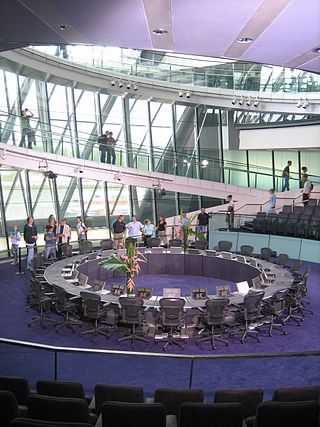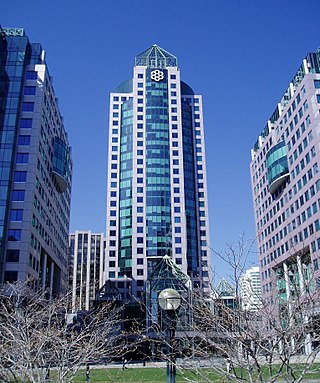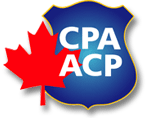
Local government is a generic term for the lowest tiers of governance or public administration within a particular sovereign state.
In many countries, a mayor is the highest-ranking official in a municipal government such as that of a city or a town. Worldwide, there is a wide variance in local laws and customs regarding the powers and responsibilities of a mayor as well as the means by which a mayor is elected or otherwise mandated. Depending on the system chosen, a mayor may be the chief executive officer of the municipal government, may simply chair a multi-member governing body with little or no independent power, or may play a solely ceremonial role. A mayor's duties and responsibilities may be to appoint and oversee municipal managers and employees, provide basic governmental services to constituents, and execute the laws and ordinances passed by a municipal governing body. Options for selection of a mayor include direct election by the public, or selection by an elected governing council or board.

A council is a group of people who come together to consult, deliberate, or make decisions. A council may function as a legislature, especially at a town, city or county/shire level, but most legislative bodies at the state/provincial or national level are not considered councils. At such levels, there may be no separate executive branch, and the council may effectively represent the entire government. A board of directors might also be denoted as a council.

Michael Deane Harris is a retired Canadian politician who served as the 22nd premier of Ontario from 1995 to 2002 and leader of the Progressive Conservative Party of Ontario from 1990 to 2002. During his time as party leader, he heavily nudged the Ontario PC Party to Blue Toryism, advocating for the "Common Sense Revolution", his government's program of deficit reduction in combination with lower taxes and budget cuts.

The Municipality of Metropolitan Toronto was an upper-tier level of municipal government in Ontario, Canada, from 1953 to 1998. It was made up of the old city of Toronto and numerous townships, towns and villages that surrounded Toronto, which were starting to urbanize rapidly after World War II. It was commonly referred to as "Metro Toronto" or "Metro".

The mayor of Toronto is the head of Toronto City Council and chief executive officer of the municipal government. The mayor is elected alongside city council every four years on the fourth Monday of October; there are no term limits. While in office, mayors are styled His/Her Worship.
Chris Hodgson is a former politician in Ontario, Canada. He was Reeve of Dysart country in 1993, and warden of Haliburton. He was a Progressive Conservative member of the Legislative Assembly of Ontario from 1994 to 2003 representing the ridings of Victoria—Haliburton and Haliburton—Victoria—Brock. He was a cabinet minister in the governments of Mike Harris and Ernie Eves, serving variously as Minister of Northern Development and Mines, Chair of the Management Board of Cabinet and Deputy Government House Leader, and Minister of Municipal Affairs and Housing.

The National League of Cities (NLC) is an advocacy organization in the United States that represents the country's 19,495 cities, towns, and villages along with 49 state municipal leagues. Created in 1924, it has evolved into a leading membership organization providing education, research, support, and advocacy to city leaders across America. Based in Washington, D.C., it is considered part of the 'Big Seven', a group of organizations that represent local and state government in the United States. The NLC provides training and other resources to municipal officials, holds conferences, and advocates to the federal government on behalf of cities, towns and villages.

The Canadian Police Association (CPA) is an advocacy and fundraising organization that is also a registered lobbyist with the Canadian government. The CPA represents Canadian police officers. It is divided into 27 regional chapters at municipal, provincial, and federal levels. Each of these chapters is represented by either a president or director.
A municipal council is the legislative body of a municipality or local government area. Depending on the location and classification of the municipality it may be known as a city council, town council, town board, community council, rural council, village council, or board of aldermen.
Local government in Canada can be defined as all elected local authorities which are legally empowered to make decisions on behalf of its electors, excluding the federal government, provincial and territorial governments, and First Nations, Métis and Inuit governments. This can include municipalities, school boards, health authorities, and so on.
The Ontario Student Trustees' Association, officially branded as OSTA-AECO, is a registered nonprofit, nonpartisan organization and the largest student stakeholder group in Ontario. The organization's members are student trustees from school boards across the province.
Sangguniang Panlalawigan, commonly known as the Provincial Board, are the legislatures in Philippine provinces. They are the legislative branches of the provinces, and their powers and responsibilities are defined by the Local Government Code of 1991. Along with the provincial governor, the executive branch of the province, they form the province's government.
The National Union of Students, Union nationale des étudiants (NUS/UNE) was a national university and college student organization in Canada from November 1972 to May 1981. The Union represented over 350,000 students in post secondary education. Donald Thompson, Sidney Shugarman, Pierre Ouellette, Myron Tiechko, Daniel Palmer, Dawn Hassett, Doyle Brown and Ian Boothe are listed as the first directors.

The Romblon Provincial Federation of Sangguniang Kabataan(PFSK) is the official association of elected Sangguniang Kabataan presidents in the province of Romblon. It is composed of eighteen (18) members; seventeen (17) Municipal Sangguniang Kabataan Federation President and one (1) Provincial SK Federation President. It is their thrust to conduct and implement programs that would improve the youth of Romblon socially, intellectually, spiritually, politically, and morally to be dynamic, productive, and effective citizens and future leaders of the province of Romblon and the republic as a whole.

The Liga ng mga Barangay sa Pilipinas and the Asosasyon ng mga Kapitan ng Barangay are formal organizations of all the barangays in the Philippines. Presently, almost 42,000 barangays are part of this organization, making it the association of Philippine local government units with the largest membership.
Friendship Centres are nonprofit community organizations that provide services to urban Inuit, Métis, and First Nations people. Friendship Centres were first established in the 1950s, and there are now more than 100 centres across Canada. Friendship Centres typically provide a variety of programs and services to its members, which can include youth programs, health services, housing, employment, cultural programs, and more.
A double direct election is an election in which an individual is elected to two political offices in one electoral event. The term originates in Canada, where in certain regional council elections, an elected individual serves on a regional council and a constituent municipal government within that region. It differs from holding two elections with a double simultaneous vote in that in a double direct election, an individual is automatically elected to two political positions, whereas in double simultaneous vote elections, the pools of candidates are separate for the two positions.

One in eight Canadian households lived in a residential condominium dwellings, mostly located in a few census metropolitan areas according to Statistics Canada Condominiums exist throughout Canada, although condominiums are most frequently found in the larger cities. "Condominium" is a legal term used in most provinces of Canada. in British Columbia, it is referred to as "strata title" and in Quebec, the term "divided co-property" is used, although the colloquial name remains "condominium".










